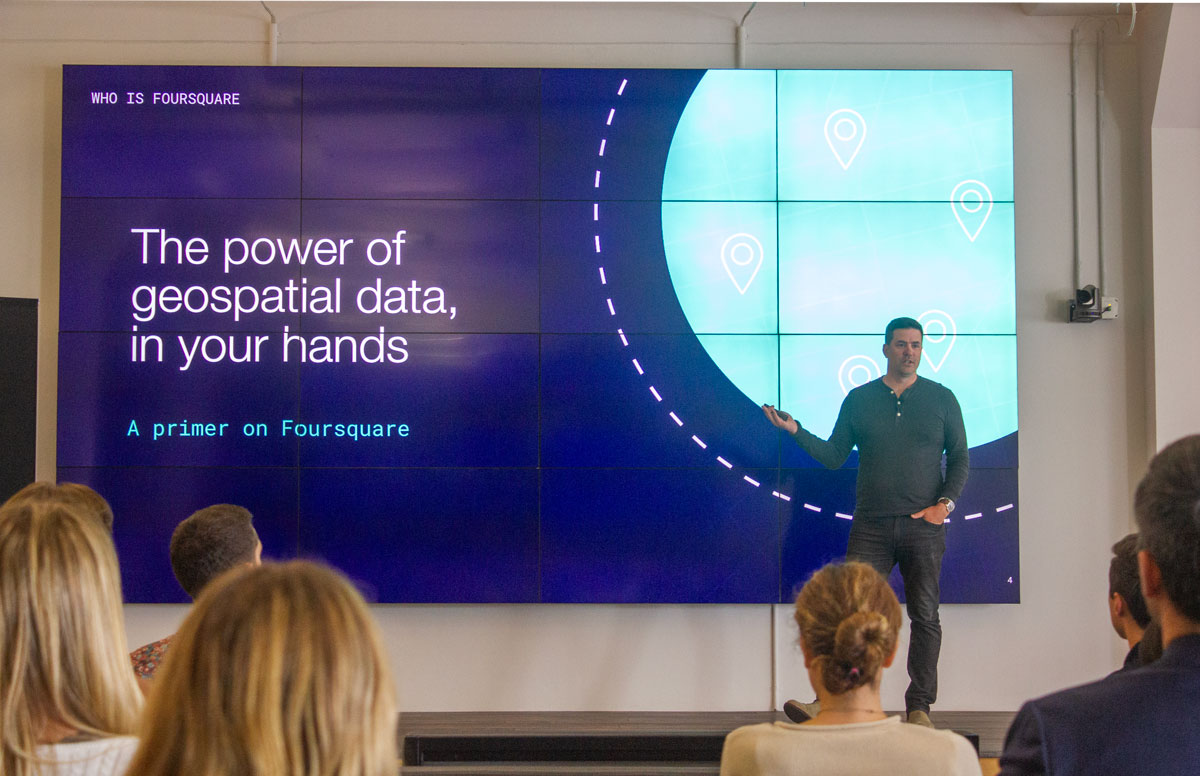The way many of us view tech changed in 2018.
In 2019, consumers will ask for more from the products and tools they use every day, and demand empathy and excellence from the companies in their orbit. They will want companies to take a stance on the issues that matter, and to foster a more direct and open relationship with them. It’s my belief that the best and most responsible tech companies will be the first to respond to this demand.
At Foursquare, we have always believed it’s important to lead by example. We do this by devoting ourselves to data quality; to transparency and privacy; and to fostering a close connection with our clients and consumers.
Last year, we were rewarded with big wins:
- Several of the biggest and most innovative brands in the world, including Tinder, TripAdvisor, Hilton Honors, and AccuWeather, selected our Foursquare Pilgrim SDK to give their apps location awareness and real-world context. We continue to set the bar for precision and accuracy at more than 105 million places around the globe.
- Our Attribution measurement product took off. It now measures ads across TV, digital, search, and other formats for more than 250 partners, including publishers, networks and platforms such as Twitter, Spotify and iHeartMedia. Since launching in 2016, Attribution has measured over $2 billion in media spend.
- In the past year, industry-leading brands like Subway, CKE Restaurants, LL Bean, TJX and Office Depot have all chosen Foursquare for our singular understanding of how people move through the world — one of the most reliable ways to understand consumer behavior.
- We secured our Series F financing co-led by Simon Ventures and Naver, the South Korean search giant, as well as our longtime champion, Union Square Ventures. This list of strategic investors illustrates the power of Foursquare and the belief that our tech will transform industries spanning retail, dining, advertising, and so much more — in the U.S. and globally.
- We are thrilled to have been named #10 on the Ad Age Best Places to Work 2019 ranking! This is the third year in a row we’ve made this prestigious list.
Beyond our own success, it’s an exciting time for location technology. Here’s a quick take on what to expect in 2019:
For Marketers:
Where Matters
In today’s landscape, marketers are increasingly responsible for revenue as well as branding. One of the fastest growing areas is location-based advertising, which can be used to help tie campaigns to real-world spend. Per the U.S. Census, over 90% of consumer spending still happens in the offline world. And yet many brick & mortar brands are stuck with the legacy viewpoint that digital advertising drives online sales, while traditional media drives traffic to storefronts.
Needless to say, in categories where sales remain heavily offline, such as Telco, grocery, retail, and auto, digital media clearly influences offline business. So measurement and internal metrics need to catch up to the new reality. We’ve seen over the last few years that marketers have been tapping into the additional layer of real-life insights they can access about their consumers to create more personalized, contextually-relevant and ambitious campaigns. In fact, BIA/Kelsey predicts the location-based advertising market will grow by a compound annual growth rate (CAGR) of more than 17 percent through 2022.
Accurate data will separate good from bad marketing
The marketing industry is crying out for more transparency. Simultaneously, the number of bad location actors is on the rise.
We know it’s confusing to separate the wheat from the chaff. Foursquare powers location experiences for over 1 billion people globally. We also throw out more than 80 percent of the third-party data we consume as not meeting our accuracy and quality bar. Our extensive network of over 150,000 registered developers using our tools lets us evaluate which third-party data sets are full of false claims and spotty data. No other independent location player has the kind of privileged first-party data view and billions of human-powered confirmations to test and train accuracy down to individual visits.
We see a big theme that marketers need to demand “true stops” from data sources — how do you know a consumer was not driving or walking nearby a particular venue? Most third-party data is very sporadic and can’t separate true stops from passing by. Also, is the data based on a “multi-sensor” view? Only multi-sensor can handle instances when a consumer is in a mall or multi-story building, or a dense urban shopping area where GPS is distorted by tall buildings.
Precision and accuracy are necessary for targeting and for measurement. There is greater pressure than ever on publishers to bring in independent measurement services for more transparency into campaign impact. Sophisticated companies are realizing that legacy KPIs such as click-through rates are outdated and have a poor correlation to real incremental business results. Last-click attribution is far weaker than tying brand view-based exposure to actual consumer behavior like offline store visits and sales.
For developers and their consumers:
Context is everything in apps and services
Technology players are leaning into opportunities to leverage location for enhanced experiences, notifications and personalized content — both to encourage deeper engagement and meet app store requirements.
Tinder Places is a great example. Tinder makes the dating experience better with location awareness, but it’s up to the consumer to opt-in to the enhanced service if they see the value.
A location layer is now expected for tech giants like Apple, Samsung, Uber and Twitter, and it will be a bigger focus for rising players too. Companies can’t afford to get it wrong, yet it’s nearly impossible for companies to get data accuracy right on their own.
In 2019, developers will continue looking to — and licensing from — location tech experts to ensure quality and accuracy. Nationally, Foursquare’s location technology and machine learning methodology is up to 30x more accurate than traditional cartographic methods, particularly in challenging contexts like dense urban areas or malls.
In the past year alone, our commercial coverage has improved by nearly 300 percent, all the while maintaining accuracy and improving precision. In addition to some of the marquee-name clients that have chosen Foursquare, more than 100 start-ups and growing companies have registered for our new Start-Up API tier (a step up from our free offering to developers, and below our Enterprise-grade license) since we launched in April 2018, ranging from artificial intelligence companies to ride-sharing apps to home delivery services.
Privacy and ethics will drive tech regulations
When it comes to regulating the location technology space, not all location tech is created equal. Regulation will address privacy issues.
In Europe, the General Data Protection Regulation (GDPR) set new standards for how companies can use people’s data and the user consent that’s required to do so. Similar legislation has been proposed to regulate user data in the U.S. We go above and beyond what is required by implementing GDPR consumer rights such as portability and the right to be forgotten not just in the EU, but to all our users globally. We support smart privacy regulations, and we set a high bar for privacy in our industry.
Security and compliance conversations will — and indeed, should — continue to be at the center of every discussion. At Foursquare, we’ve introduced ethics training for all our staff and we are passionate supporters of a Hippocratic Oath for data scientists — a commitment for data-driven tech companies like ours to “do no harm”.
Apps should be required to capture informed consent particularly for location awareness, and it’s necessary that disclosures are not buried in long terms and conditions, but instead appear separately from the basic terms, written in plain language. And the consumer should always be in control.
Accessing and using information about how people move through the world is an enormous responsibility — and one that we take very seriously at Foursquare. For users to feel comfortable revealing their location data, it’s essential that the tech industry adds value to their lives in exchange for that trust — a key part of our mission to build the world’s most trusted, independent location technology company.
All told, there’s never been a more important and exciting time for location technology.



